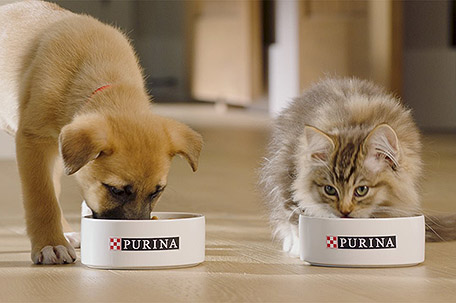
BPT
Getting a new pet is like bringing home a new member of the family. Anticipation, excitement, and joy are just a few of the many emotions you may feel when you bring home a new puppy or kitten. The first year of a puppy and kitten’s life is a busy developmental period, both physically and mentally. There is growth, behavioral and nutritional milestones to expect and plan for. Although it feels wonderful to welcome your new companion home, you will likely have various questions and concerns, especially about the nutritional needs of your growing pet.
Purina veterinarian Dr. Callie Harris, D.V.M., and Purina senior pet behavior expert, Dr. Annie Valuska, Ph.D., offer their tips and expertise for how you can help set the foundation for a healthy future.
Early nutritional insight
By weeks six to eight, your kitten or puppy should get all their nutritional requirements from food. To ensure your new addition gets the needed daily nutrition for their age, select pet food specifically for puppies or kittens. This variation of pet food has a different nutrient profile specifically crafted to support development compared to adult pet food.
According to Purina pet nutritionists, it’s important to make sure you feed your puppy or kitten food that is balanced with essential nutrients, such as:
• DHA — An omega fatty acid to help support brain and vision development
• Antioxidants — Help support developing immune systems
• Calcium and phosphorus — Helps support teeth and bones
• Protein — High-quality protein helps support growing muscles
Most dogs and cats are considered puppies and kittens until they reach 12 months of age, so don’t switch to adult food too early. For dogs, small-breed dogs will physically develop faster than large breeds. Breeds that weigh 50 pounds or more can take up to 18 months to reach maturity and should eat a large-breed puppy food. Be sure to always talk to your vet if you have questions.
“Factoring in your puppy’s breed size is important to consider when choosing a puppy food,” Harris said. “Large breed puppies have a higher risk of developing joint problems as adults. Feeding them a large breed-specific puppy food can help support joint health and mobility into adulthood. Small breed puppies have smaller mouths, so they may prefer the smaller kibble found in small-breed specific puppy formulas.”
Unlike puppies, breed isn’t a factor when choosing kitten food. However, Purina nutritionists recommend feeding kittens a combination of wet and dry food.
“In feeding your kitten a varied diet of wet and dry food, you are helping them develop their palate,” said Harris. “The more variety in your kitten’s diet, the more adaptable they will become to diet changes as they age.”
Establishing a feeding routine
Puppies:
Typically, for the first six months, you should give your puppy their daily caloric requirement split into three equal-sized meals. Establish a feeding routine by feeding them the same amount of food at the same times each day. Doing this helps keep their digestive system regular, which can make housetraining easier.
Kittens:
Keeping in mind their daily calorie needs, it is important to establish a healthy feeding schedule for your kitten. Cats are creatures of habit, so be sure to feed your kitten at the same time and place each day. Decide early on whether you plan to feed your kitten once, twice or three times a day and stick to the routine for consistency.
Preventative care and socializing
Beyond nutritional needs, it’s important to make sure your puppy and kitten receive their core vaccines, deworming against common parasites, and begin receiving preventative care during their first year.
In addition to preventative care, socialization is an integral part of the development of your pet. To make sure your puppy or kitten is comfortable around other people and pets, socialization should start early.
“After receiving their core vaccines and preventative care, your puppy or kitten should be safely exposed to many people, places and experiences to help their behavioral development,” Valuska said. “Early socialization can help your pet grow into a confident, well-mannered adult.”
With the right information, nutrition, and care, you can help set the foundation for a healthy future for your pet. For more information on Purina’s recommended puppy and kitten formulas, general tips and more, visit: Purina.com/Healthy-Start.
















Leave a Comment